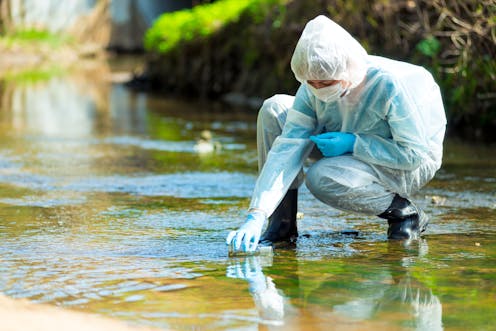
While most of the UK general election campaigning so far has focused on issues like economic growth and fixing the cost-of-living crisis, several key environmental issues are not getting enough attention.
Climate change should be top of the agenda. The world is experiencing record-breaking temperatures, with temperature rises in the Antarctica being particularly alarming. This year, there has been a record number of weather-related insurance claims in the UK linked to extreme weather events.
Yet while addressing climate change has potential benefits for jobs, energy security and lower bills, it is not considered top priority by voters. And most political parties are giving it relatively little attention.
Whether politicians or the electorate like it or not, the impacts that climate change is already having on the economy, food security, public health and migration, should not be ignored. This election campaign offers an opportunity to show strong political leadership by discussing critical environmental challenges, but major political parties are playing it safe.
1. Financing the net zero transition
While the Green party gives climate change top priority, none of the larger parties have made this issue a driving force for their policies.
The Conservative party’s manifesto affirms a commitment to climate change by addressing resilience of the most vulnerable members of the Commonwealth but they would rule out routes to a low-carbon future including green levies, road pricing schemes and a frequent flyer levy.
The Labour manifesto recognises that the climate and nature crises are serious long-term challenges. Its plan for publicly-owned Great British Energy includes measures such as doubling onshore wind, tripling solar power and quadrupling offshore wind by 2030, with investment in carbon capture and storage, hydrogen and marine energy, and energy storage.
But details about how the net zero transition will be financed are missing across the board. The UK needs better investment in both net zero and climate adaptation needs. A shift away from fossil fuels not only reduces greenhouse gas emissions but also minimises exposure to volatile, expensive and polluting energy sources. There is also limited discussion in the election on the benefits of reduced energy demand.
2. Restoring biodiversity
Many people have been affected by recent increases in food prices, with more than four in 10 adults having bought less food due to rising costs. While the cost of food is detrimental for many, cheap food production is linked to to fundamental environmental problems.
There’s little mention from politicians of how biodiversity loss, the nature crisis and intensive farming affect long-term food security. A new report from thinktank the ODI states that close to 50% of species are declining and up to one million species face possible extinction.
The UK lags behind its commitments to help address and fund this global biodiversity loss. We depend on nature for food and a healthy ecosystem is vital for food supplies. A decline in pollinators has been shown in the UK, and pollinator loss in the US has already been linked to reduced crop yields.
Almost half of the UK’s food comes from other countries, so this should be a topic for close international collaboration. Biodiversity loss can be alleviated by protecting species and forests, reducing emissions, farming more regeneratively and using nature-based solutions such as rewilding.
3. Cleaning up rivers
There has been a lot of public outrage about water companies pumping sewage into rivers and the sea, with more than 80% of English rivers estimated to have high pollution levels from sewage overflows and manure run-off from agricultural fields.
Few politicians are calling for systemic change to how the UK water system operates. Sewage has been a big campaign issue for the Liberal Democrats, but much of the media discussion has been about party leader Ed Davey falling into Lake Windermere to highlight the issue, rather than about detailed policy proposals.
Discussion about ways to mitigate increased flooding due to more extreme weather is also missing. Measures such as rewilding could improve the UK’s flood resilience. England has a fully privatised water system, which is unusual for most countries, and there is lack of debate whether this is the best approach to providing a reliable and clean water service which is essential to everyone.
4. Retrofitting homes
Another missed opportunity is how to fix Britain’s leaky and inefficient homes. In England and Wales, the average energy efficiency rating of a home is D. For homes built before 1930, more than 80% are rated from D to G, indicating low energy efficiency.

There are policies for home retrofits in both the Labour and Scottish National party (SNP) manifestos. Labour will provide grants and low interest loans for measures such as insulation, solar panels, batteries and low-carbon heating. The SNP promises lower VAT rates for the construction sector to encourage retrofitting of existing buildings.
However, a fully costed housing improvement programme that would address UK homes in need of retrofitting is missing. The UK needs a long-term programme with easy-to-access grants and zero interest loans for households to install measures such as insulation, heat pumps and solar power, to ultimately reduce their energy bills too.
Energy-efficient homes can help reduce fuel poverty and provide more comfortable living conditions. Homes urgently need to be more climate resilient by preparing them to better cope with extreme weather such as summer heatwaves and cold winter events.
5. Improving sustainable transport
The UK needs to drastically reduce its high reliance on cars. In 2023, a record number of 41.4 million vehicles were on the road in the UK. While car-related emissions reduced, only one in 40 of all vehicles is zero emission. Politicians could better support active travel options (like riding bikes and walking) or improve public transport connections.
Silence on this issue is unsurprising, given that congestion charges and related measures have proven unpopular in some areas. But homes with close links to public transport and policies that promote 15-minute cities that have accessible sustainable transport options could bring multiple benefits for health and wellbeing. Low-traffic neighbourhoods can create space for children’s play and benefit residents’ quality of life.
Mari Martiskainen receives funding from UKRI.
This article was originally published on The Conversation. Read the original article.







